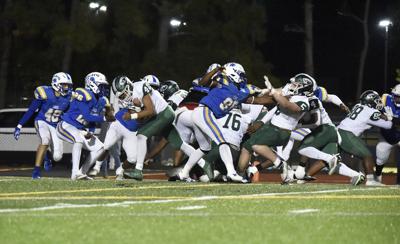New wording in the South Carolina High School League bylaws is attempting to make clear that high school athletes across the state are not permitted to use their name, image and likeness to earn compensation.
The new approved wording in the SCHSL’s bylaws are aimed to align with a recent state budget clause, which banned public school districts from joining any athletic association that permitted, allowed or authorized such compensation, according to recent .
Previously, the SCHSL bylaws stated that athletes “may earn compensation” as long as that compensation was not tied to their athletic performance and did not involve school or league logos, among other elements.
Presumably, the previous wording in the bylaws could have permitted a high school athlete to create content on social media related to their sport (e.g., a basketball player filming trick shot videos) or film car commercials with a local car dealership with a football in their hand, as long as those compensation opportunities did not specifically relate to their school, league or have anything to do with performance or incentives.
Now, however, the wording in the bylaws has changed.
includes the phrasing: “does not permit, allow or authorize students to earn compensation from the use of their name, image and likeness.”
State Sen. Sean Bennett, who authored the Legislature’s budget clause, told the Daily Gazette that the clause was directed at the SCHSL.
“I hope everybody involved with high school athletics realizes they are extracurricular activities, and they are no place for the ugliness or business activities ruining college athletics,” Bennett, R-Summerville, said in the report.
Jerome Singleton, the SCHSL’s commissioner, told the Daily Gazette that the new wording is not a policy for or against name, image and likeness (NIL). Rather, it seems to be solidifying the intention of the league to not condone NIL deals.
“From the very beginning … the league does not support NIL for athletic purposes. That’s the only authority we have the right to reject,” Singleton said to the outlet. “You can change the wording, but you can’t change the intent.”
The SCHSL’s executive committee unanimously approved the new wording.
For local high school athletes, the changing of the verbiage may not lead to any immediate repercussions or sudden changes. However, the new emphasis on NIL deals both nationwide and across South Carolina opens up a budding and timely conversation regarding the topic as a whole.
Across the college athletics landscape in recent years, the approval of Name, Image and Likeness deals have completely changed collegiate athletics. Athletes now have the ability to profit from their status as collegiate athletes, and some have taken advantage of the new rules to collect millions of dollars in endorsement deals. In many cases, students will transfer to new schools in order to position themselves to maximize their value and marketability.
The effect of NIL deals across college athletics has led to a radical shift in dynamics, leaving many to opine about the lack of “pureness” that once existed within college sports.
As NIL numbers have increased in college athletics, the conversations — expectedly — have trickled down to the high school level. The Daily Gazette reports that more than 40 states allow for NIL deals for high schoolers. South Carolina is not one of those states.
What does this all mean for the future of potential NIL deals across South Carolina high school sports?
That is the question on the minds of many families of young athletes in the state.
Some around the state’s high school athletics world say that the new wording is still vague, perhaps intentionally.
Consider this example: A talented local high school softball player begins to create content on Instagram, with that content being centered around the sport of softball with homemade videos in her backyard. That account then begins to pick up traction, gaining tens of thousands of likes, comments and follows because of the athlete’s carefully crafted online presence. Because of that success, athletic brands reach out to the athlete to partner with them in their online videos, which have nothing to do with the athlete’s school, league or other athletic advancement opportunities.
In that example, is the athlete in violation of the league’s rules, and thus completely shut down from using their athletic abilities — even outside of their high school competition — to make money?
Similarly, if a local football player — who regularly partners with a local charity to give back through football-related camps and activities on the weekend — is approached by a local restaurant to do a television commercial centering around their “local fame” for their charitable efforts, would they be unable to receive compensation due to the fact that they were simply holding a football in the commercial?
The league’s new verbiage, to some, seems to offer more questions than it does answers. Others say that a continued gray area will continue to kick the can down the curb and potentially force high-level and marketable high school athletes’ families to consider moving to a new location where their athlete is allowed to receive payment for their athletic abilities.
Opinions range plenty on the topic of Name, Image and Likeness, and the South Carolina High School League’s new policy is already making waves in conversations within local athletics circles.








(0) comments
Welcome to the discussion.
Log In
Keep it Clean. Please avoid obscene, vulgar, lewd, racist or sexually-oriented language.
PLEASE TURN OFF YOUR CAPS LOCK.
Don't Threaten. Threats of harming another person will not be tolerated.
Be Truthful. Don't knowingly lie about anyone or anything.
Be Nice. No racism, sexism or any sort of -ism that is degrading to another person.
Be Proactive. Use the 'Report' link on each comment to let us know of abusive posts.
Share with Us. We'd love to hear eyewitness accounts, the history behind an article.